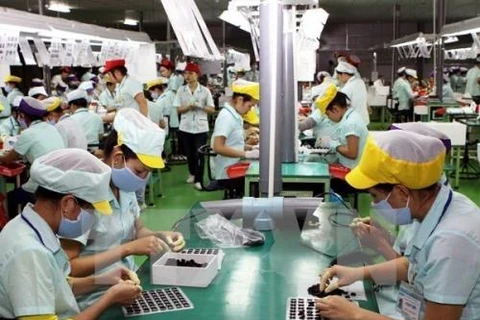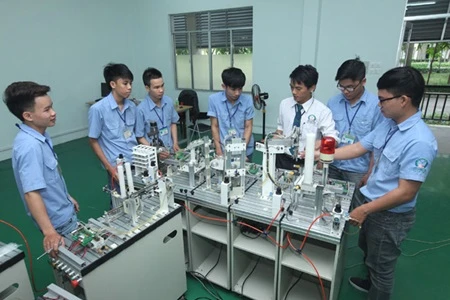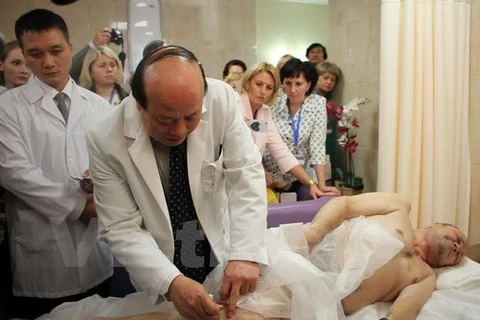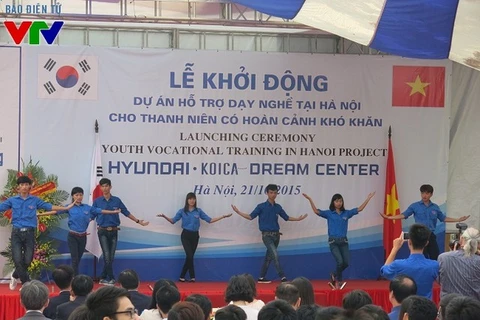After more than four years of implementation, a programme to develop high-quality human resources has shown positive results and will be continued, according to Hua Ngoc Thuan, Deputy Chairman of the HCM City People's Committee.
Civil servants, for example, have been trained in basic knowledge of political theory, professional skills and task performance skills, he said, adding that vocational training had also enhanced human resource quality.
The programme was established by the HCM City 9th Party Congress for the 2011-2015 period.
It focused on tertiary education, vocational training, higher education, human resources for business management, human resources for the political system, human resources for the health sector, and discovery and development of talented people in sports, arts and culture.
Over the past four years, the city has provided vocational training to more than 2.8 million people, increasing the rate of skilled workers at companies to 72 percent, 2.4 percent higher than the city's target for the 2011-15 period.
Nearly 52,000 people have been trained in business management, meeting 171 percent of the programme's target.
The city's Party Committee has also chosen university students with good marks and young civil servants, who are trained in leadership and management skills.
After participating in training courses, the students are appointed to work at district, commune and ward administrative agencies.
The city has also sent graduates and civil servants to study abroad for master's or doctoral degrees. As many as 543 people have completed their master's or doctoral degrees, and now work at departments and agencies.
Despite success, implementation has been slow and only 50 percent of the targets for some criteria had been reached, according to the draft political report issued at the 10th Party Congress of HCM City (2015 -20 term).
Programmes on tertiary education, for example, have lacked connections among training faculties, causing overlap and waste in training. Some tertiary education programmes are also outdated.
Mai Thi Que of the HCM City Institute for Development Studies said that many graduates still did not meet job requirements, especially in foreign languages and the use of modern equipment and technologies.
Many graduates show weaknesses in teamwork, self-study, research and manner of working.
Business cooperation
Pham Xuan Hong, Chairman of the HCM City Garment, Textile, Embroidery and Knitting Association, said the labour-intensive garment and textile sector depended heavily on skilled human resources.
Most small- and medium-size companies in the sector are facing difficulties in recruiting skilled employees, especially in management.
"We have ideas of uniting companies with vocational schools in training workers to develop high-quality human resources and use training programmes closely linked to work requirements of companies," he said.
Nguyen Hong Minh, Deputy Head of the Ministry of Labour, Invalids and Social Affairs' Vocational Training Department, said: "Companies have upgraded their production technologies constantly, while vocational schools cannot keep up with the change."
"Cooperation between vocational schools and companies is an important solution. Based on labour demand of companies, vocational schools will invest in equipment and let trainees practice at the companies," he said.
In recent years, the city has improved cooperation between vocational schools and companies, including arranging trainees to practice at companies, inviting company leaders to participate in vocational school examination boards and recruiting trainees at vocational schools.
The models have brought benefits to schools and companies.
The city's vocational schools have also worked with international schools to improve training as well as teaching methods.
ASEAN's labour rules
By the end of this year, the establishment of the ASEAN Economic Community will allow the free flow of skilled labour in ASEAN in eight professions: doctors, nurses, engineers, architects, accountants, surveyors and tourism personnel.
The eight professions account for only 1 percent of the labour force, but they require high professional skills and have high income, according to experts.
If Vietnamese workers cannot meet the demand, they will not be able to compete with workers from ASEAN who have professional skills, foreign language skills and professional working manner.
Currently, the city has an oversupply of architects as demand last year dropped by 40 percent against 2013, according to the city's Centre for Human Resources Forecasting and Labour Market Information.
Similarly, the demand for accountants is not high.
Meanwhile, the rest of the six professions in the city face a labour shortage, with many in the field not possessing the requisite skills.
Tran Anh Tuan, deputy director of the centre, said job-seekers should not focus solely on educational level and realise the importance of job experience.
Schools should also be realistic about their training and try to meet the demand of development, he said, adding that companies need to work with schools to improve training and meet market demand.
The city plans to continue the high-quality human resources programme in the 2015-20 period.
It will reform training programmes so that they are more closely linked to market requirements, and focus on investment in human resource development.
As of the end of 2013, 70 percent of HCM City's population of nearly 8 million were of working age, according to the city's Sub-department of Population and Family Planning.-VNA

























